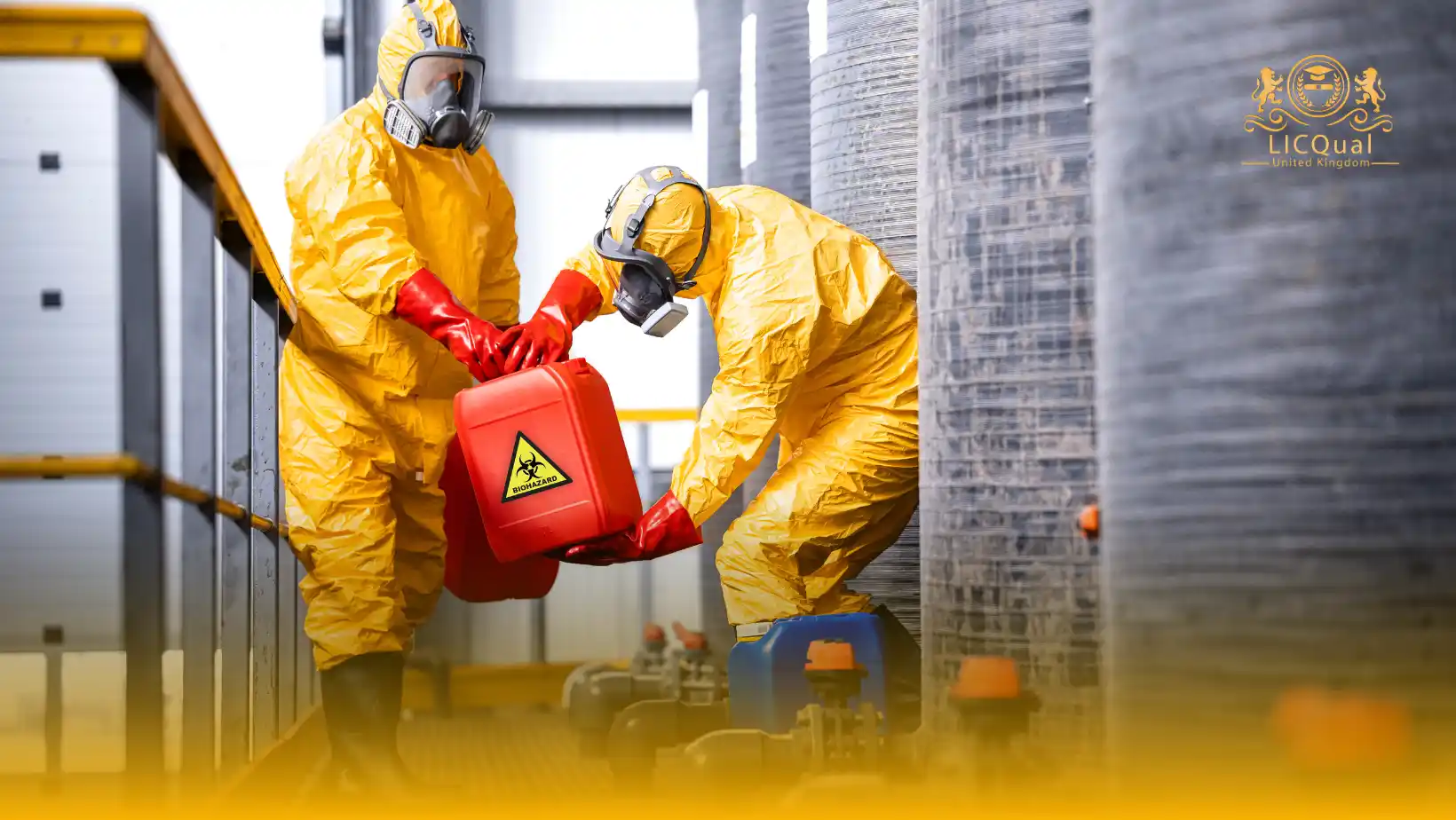In any food-related industry, the safe storage and handling of chemicals is vital to maintaining product integrity, protecting worker health, and ensuring full compliance with food safety standards. The LICQual Certificate in HACCP Chemical Storage and Handling is a specialized training program designed to provide food industry professionals with in-depth knowledge and practical skills for managing chemicals safely within a HACCP-based food safety management system.
This internationally recognized course focuses on the critical importance of chemical hazard identification, proper storage protocols, and safe handling procedures in environments where chemicals are used for cleaning, sanitation, pest control, and maintenance. It bridges the gap between operational safety and regulatory compliance, making it a valuable qualification for anyone involved in food production, processing, packaging, or facility hygiene.
The course is ideal for food safety officers, quality assurance personnel, sanitation teams, facility managers, and food handlers who come into contact with chemical substances in the workplace. By integrating HACCP principles with chemical safety practices, learners will be empowered to minimize risks of contamination, prevent accidents, and ensure food safety at every stage of production.
Participants will benefit from a balanced mix of theoretical instruction and real-world application, covering topics such as chemical classification, labeling standards (GHS), Material Safety Data Sheets (MSDS), spill control, segregation, emergency response, and compliance with international food safety regulations. The course is designed to suit various food industry sectors, including manufacturing, catering, hospitality, and retail.
Upon successful completion, learners will be awarded the LICQual Certificate in HACCP Chemical Storage and Handling, a credential that reflects their capability to manage chemical risks in food environments effectively. This certification not only enhances professional credibility but also supports a culture of safety, compliance, and continuous improvement within any food operation.
The LICQual Certificate in HACCP Chemical Storage and Handling provides a comprehensive understanding of how chemical hazards impact food safety and how to control those hazards through effective storage and handling practices. Rooted in HACCP (Hazard Analysis and Critical Control Points) methodology, the course helps organizations integrate chemical safety into their overall food safety management systems.
Key learning areas include hazard classification and risk assessment, the importance of proper chemical labeling and documentation, the use of PPE (Personal Protective Equipment), safe chemical handling techniques, and emergency procedures for spills and exposures. The course also explores critical control points where chemical contamination risks are highest and outlines preventive measures aligned with global standards.
Achieving the LICQual Certificate in HACCP Chemical Storage and Handling positions professionals and organizations as proactive leaders in food safety and workplace health. It not only helps reduce the risk of chemical-related incidents but also strengthens consumer trust and business compliance in today’s safety-conscious food industry.
Course Overview
Qualification Title
LICQual Certificate in HACCP Chemical Storage and Handling
Total Units
6
Total Credits
18
GLH
72
Qualification #
LICQ2200082
Qualification Specification
To enroll in the LICQual Certificate in HACCP Chemical Storage and Handling, applicants must meet the following criteria:
|
Qualification# |
Unit Title |
Credits |
GLH |
|---|---|---|---|
|
LICQ2200082-1 |
Introduction to HACCP and Its Application to Chemical Storage and Handling |
3 |
12 |
|
LICQ2200082-2 |
Chemical Hazard Identification and Risk Assessment |
3 |
12 |
|
LICQ2200082-3 |
Chemical Storage Guidelines and Best Practices |
3 |
12 |
|
LICQ2200082-4 |
Safety Protocols for Handling Hazardous Chemicals |
3 |
12 |
|
LICQ2200082-5 |
Monitoring, Documentation, and Record-Keeping in Chemical Handling |
3 |
12 |
|
LICQ2200082-6 |
HACCP Compliance and Continuous Improvement in Chemical Handling |
3 |
12 |
By the end of this course, learners will be able to:
Introduction to HACCP and Its Application to Chemical Storage and Handling
- Demonstrate a clear understanding of the principles and concepts of the HACCP system.
- Explain the relevance and application of HACCP in chemical storage and handling environments.
- Identify key international regulations and compliance standards for chemical safety.
- Discuss the benefits of implementing HACCP to improve safety and risk management in chemical handling.
Chemical Hazard Identification and Risk Assessment
- Identify and categorize various types of chemical hazards in the workplace.
- Perform effective risk assessments to determine the potential risks associated with chemical storage and handling.
- Develop and recommend appropriate control measures to mitigate identified risks.
- Evaluate the effectiveness of existing risk management systems and propose improvements.
Chemical Storage Guidelines and Best Practices
- Explain the key principles and best practices for the safe storage of chemicals, including storage conditions and handling protocols.
- Understand the importance of proper labeling, segregation, and inventory control of chemicals to prevent accidents.
- Assess chemical storage environments to ensure compliance with safety guidelines and standards.
- Recognize the specific requirements for the safe storage and disposal of hazardous materials.
Safety Protocols for Handling Hazardous Chemicals
- Identify and describe the various safety protocols for handling hazardous chemicals safely.
- Demonstrate the proper use of personal protective equipment (PPE) to minimize exposure to chemicals.
- Develop and implement emergency response plans for chemical spills and accidents.
- Understand first aid measures related to chemical exposure and implement appropriate actions in an emergency.
Monitoring, Documentation, and Record-Keeping in Chemical Handling
- Understand the importance of continuous monitoring in ensuring safe chemical handling and storage.
- Develop and maintain effective documentation and records related to chemical management, inspections, and risk assessments.
- Implement systems to track chemical inventories, hazardous material handling activities, and compliance audits.
- Ensure compliance with regulatory requirements by maintaining accurate and up-to-date records for audits.
HACCP Compliance and Continuous Improvement in Chemical Handling
- Evaluate the effectiveness of existing HACCP systems in chemical storage and handling environments.
- Implement strategies for continuous improvement in chemical safety management practices.
- Conduct internal audits to ensure compliance with HACCP guidelines and industry standards.
- Provide recommendations for ongoing training and system upgrades to maintain high safety standards in chemical handling.
This diploma is ideal for:
Assessment and Verification
All units within this qualification are subject to internal assessment by the approved centre and external verification by LICQual. The qualification follows a criterion-referenced assessment approach, ensuring that learners meet all specified learning outcomes.
To achieve a ‘Pass’ in any unit, learners must provide valid, sufficient, and authentic evidence demonstrating their attainment of all learning outcomes and compliance with the prescribed assessment criteria. The Assessor is responsible for evaluating the evidence and determining whether the learner has successfully met the required standards.
Assessors must maintain a clear and comprehensive audit trail, documenting the basis for their assessment decisions to ensure transparency, consistency, and compliance with quality assurance requirements.







